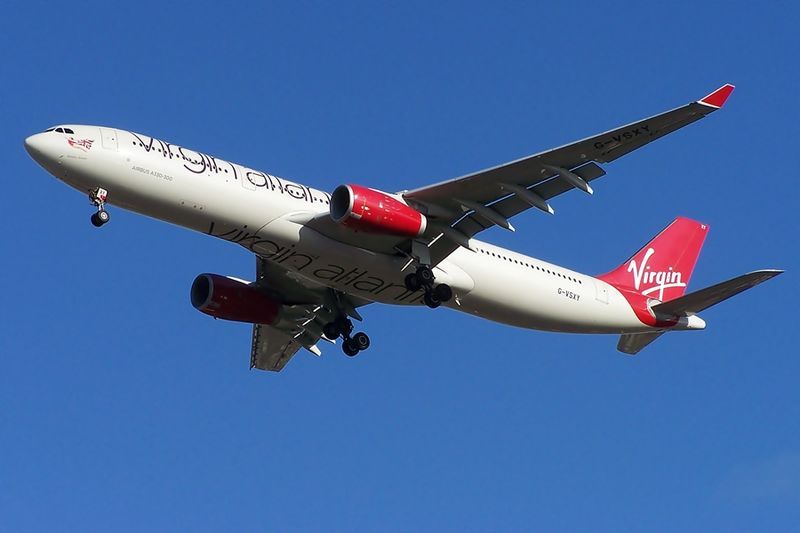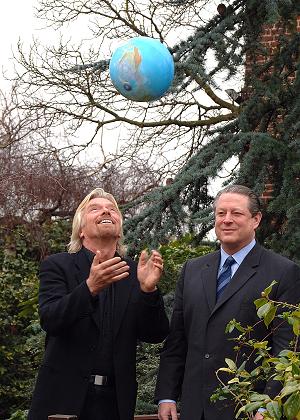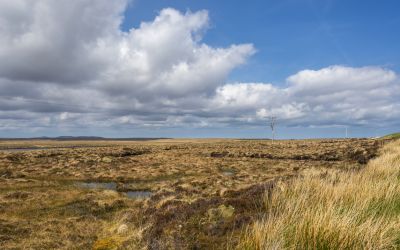The entrepreneurial approach to climate change - businesses and sustainability
Most corporates publish reports or pages on their websites which have an environmental policy and a carbon reduction programme. Others may offset their emissions to be carbon neutral. So how does a business like Virgin with its radical approach to business and its carbon intensive industries such as aviation, address the potential conflict between encouraging people to consume more products and services and climate change? And are there commercial opportunities to make the aim of finding solutions to climate change more appealing?

We have a wide-ranging portfolio of businesses in both developed and developing countries and are well aware of the major global interconnecting challenges of huge population growth, poverty, over-use of the planet’s depleting resources, food and fuel security and climate change.
These are vastly complex and difficult issues to get to grips with, and at times can be completely overwhelming. However, I am an optimist. I believe it is possible that one day we will live enjoyable and healthy lives at the same time as using only the resources of a single planet whilst only emitting small amounts of carbon. Poverty will be unusual and we will know where our next meal (and many more) will be coming from.
Big business is often reviled by some of the ‘green’ groups, but I think we can make a valuable contribution. We can learn lessons from businesses which believe the impossible is possible. Sustainability is possible. In all the business management books they talk about having a vision, having drive, having self-belief and doing what might appear to be impossible. Building a successful business may not be saving the planet but if we all have that ‘let’s do it’ attitude, then we can see a way through these challenges.
Meeting the challenges means dramatic as well as piecemeal actions. It means thinking in the long-term as well as short-term. Unfortunately we have all been guilty of making decisions based on what will happen next month rather in the next few decades.
Governments and politicians, by their nature, focus on the short term. Businesses have to meet the demands of their shareholders which tend to be focused on the short term and I would agree that we need to plan our actions more to have positive outcomes for the longer term. Consumers, the general public, are worried about their lifestyles and the future of their children but they feel powerless to do anything as individuals.
Economics versus nature
Businesses tend to think about the laws of finance and economics which contrast starkly with the laws of nature. On the same lines as the short term/long term argument, the fundamental challenge facing us all is making the important rules by which we run our economy to complement the laws of nature. The laws of economics were created within the history of modern man to serve mankind, whereas the laws of nature go back billions of years and serve the entire eco-system – of which we are a part. So whilst the laws of economics matter, they cannot over-rule or be decoupled from the laws of nature.
Because of this, we are seeing a situation where businesses spend less time operating in isolation. I am heartened by the growing acceptance that business, governments and citizens can form a powerful triumvirate to act together on sustainability issues. Whilst there are energetic debates and diverging opinions, there is also evidence of the best academic and scientific brains and admired statesmen working together because ‘something has to be done’.
Climate change and the Virgin Group
Having said that the global challenges are not independent entities, there’s no doubt that climate change appears to be top of the agenda. However, we don’t really know if this is the one that is the most threatening to our lives and our livelihoods in the decades to come. It would be great to get out a crystal ball and see what the situation is in 2050 when we’re told that we should have cut carbon emissions by 60% and that the global population is supposed to be nine billion.
Unfortunately I don’t have that crystal ball and so I, with some clever people I work with, have to plan and forecast what life will be like, how we will run our businesses and how we will keep our customers loyal and attract new ones. In that context, having aviation, train and media businesses, we use lots of energy and lots of fuel. Our fuel bill and the concerns about the potential depletion of energy reserves, engender a sense of immediacy and urgency to the climate change issue.
That’s why we at Virgin have been creating different and innovative ways in which we can mitigate climate change beyond actions you would expect us to take such as using less fuel where we can, investing in more fuel efficient machines and light weight materials.
Last year I launched the Virgin Earth Challenge – a $25 million prize to find a commercially viable technology to remove CO2 from the atmosphere. It is just one tool in the armoury to encourage the scientific community to work in concert with business leaders to create an effective, workable and commercial plan to remove greenhouses gases from the atmosphere. My belief is that history has shown that prizes of this nature encourage technological advancements for the good of mankind. The prize is initially open for five years and entries are still being sought (www.virginearth.com for further information).
However, as much as I’m proud of the Earth Challenge and the fact that it is the largest ever science and technology prize to be offered in history, it still only targets a relatively small audience.
Earlier this year I called for the creation of a Carbon War Room. It’s still at the early concept stage but its purpose is to convene a forum consisting of a group of influential entrepreneurs who will combine their energy with the best expert thinkers in technology, policy, finance and business consultancy, and the tools to drive large scale change. The objective will be to evaluate major solutions to climate change and develop acceleration plans which address the barriers and create incentives to enable rapid and scaled deployment. The War Room will also help mobilise the financial resources and government and private sector attention on technological, policy or other solutions.
It’s early days yet for the Carbon War Room and we’re not expecting it to be launched with a core group of partners until the end of 2009. Virgin will be a founder and a contributor to the Carbon War Room which will also be supported by other Founders. We are expecting some direct benefits such as understanding the factual, non-biased global picture of the best locations and ways to produce biofuels so our transport businesses can have a pathway to a sustainable and lower carbon future.
As another major incentive to drive innovation in renewable initiatives, we also stated that all future proceeds to the Virgin Group from our transportation interests will be invested into developing renewable energy. Subsequently we have committed $400 million to the first Virgin Green Fund as the group’s primary vehicle for alternative energy investment. Virgin owns a minority stake and therefore the Green Fund is independent and it is responsible for attracting other investors who are also looking for a financial return from their investments.
Two sectors are of interest to the Green Fund – renewable energy and resource efficiency. Within renewable energy we have already invested in biofuel and hydro companies but we are still looking for opportunities in bio-mass, fuel cells, geothermals and solar. Within resource efficiency, companies in energy efficiency, energy storage, waste and water management have already been selected, but we are still looking for possibilities in emissions reductions and monitoring systems. (Visit www.virgingreenfund.com for more information.)
However, our interests go well beyond renewables and resource efficiency. We believe perhaps the single greatest opportunity to reduce the rate of climate change is reversing the rapid and unsustainable rate of deforestation.
The problem with forests is that they are worth more dead than alive through the proceeds of logging, agriculture and grazing. We need to reverse this and persuade forest owners that they are worth more alive than dead. So we ask ourselves, and others, what can we do to help develop creative ways of demonstrating the financial value of preserving the rainforests (and oceans for that matter) to ensure the economy works within the finite limits of nature. It all goes back to the central argument that the laws of economics cannot be decoupled from the laws of nature.
As our trial contribution, Virgin Media in the UK together with Virgin Unite, has just started working with the Tropical Forest Trust Climate Tree initiative, helping to finance a project in the Congo that is finding entrepreneurial ways of helping local people create value from their forests at the same time as keeping the latter alive and providing the local people with a prosperous livelihood. I believe that ‘avoided deforestation’ on a big scale will be a crucial factor in reducing carbon emissions and the effects of climate change.
Working with rainforests and aviation
I can understand people saying to me, ‘how can you talk about creating value for rainforests to counter against the 19 million tonnes of CO2 released by deforestation every day when your planes are continually circling the globe and emitting their own CO2’?
As a journalist from the UK Independent newspaper wrote in his response to the UK Government’s Stern Review:
“It is unwise for politicians to arm wrestle over rising aircraft emissions when just the next five years of carbon emissions from burning rainforests will be greater than all the emissions from air travel since the Wright Brothers to at least 2025.”
And in any case, I am not defensive about our aviation business. There are dozens of reasons why I see a buoyant future for flying our planes – there are social benefits which change the way that people connect with each other and people should be able to explore the world, learn about other cultures and see the amazing places that are at risk from climate change. There will always be airlines and we believe that the most responsible thing we can do is look at how we can minimise the impact of flying through both the investments in innovation and smart re-engineering of our operations. In addition to the big initiatives that Virgin is involved in, we are also investing in the most fuel efficient planes, looking at reducing weight and other techniques to reduce emissions and costs. With rising fuel prices, this is commercially logical as well as environmentally responsible. These are among the piecemeal actions thousands of companies are taking all over the world that will make a contribution.









